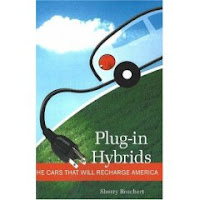High Flyers and the Commons
Anne B. Butterfield, February 11, 2009 (NewEnergyNews)
Within days of the State of California sending out IUO checks in place of tax refunds, Nadya Suleman gave birth to octuplets. She already had six children under age six (one of whom is autistic), and all the 14 were conceived artificially. She is single and lives with her mother who recently declared bankruptcy and promises to vacate the scene when Nadya and the new ones come home.
Nadya’s “big gamble” as she calls it is rationalized strictly on her unresolved needs of her childhood. Oh, please. She will take help from church and friends, she admits, but can they agree to everything that’s in store? She says she will seek no welfare, which is very unlikely. Meanwhile, how do her fellow policyholders feel about her hospital bill of perhaps $3 million?
She is a freakshow, transfixing in her narcissism and acquisitiveness; an example of all of us in our wish to defy the laws of nature and fly high on fantasy or drugs (or IVF in this case), and then rationalize the costs to be felt by everyone.
She’s as all-American as the Masters of the Universe who blew out our banking system on their brew of risk-defying tricks: subprime mortgages, credit default swaps, securitized debt, all compounded by stratospheric executive compensation. Their scheme failed as surely as the wings of Phaeton, and when they came crashing down they asked for a bailout leading to even more bonuses. Freaks.
Nadya and the bankers are the most extreme ones that drive the “tragedy of the commons” in which exuberant actors pursue their self-interest past the point where the commons -- be it a pasture, the air, the river, or the banks -- can respond resiliently and profitably.
In the famous 1968 essay “Tragedy of the Commons” author Garrett Hardin, an ecologist and microbiologist, explored the various flows of impacts that happen when geometric rates of growth propel one species to dominate a commons. Short version: it spells doom, unless, for humans, economic and legal arrangements impose costs onto users and abusers.
Appealing to peoples’ conscience to trim their impacts on the commons is pointless according to Hardin; to do so just emboldens the high flyers to use the freed-up access. Conscience has a role in leading people to conserve energy in our tainted climate commons, (no one wants to burn coal or oil per se), but the use of conscience is a sucker’s game when applied to the mortgage lenders who were instructed to peddle subprime mortgages so their companies could stay competitive bundling them into securities.
No Chairman Greenspan, the market does not just self-correct, it also implodes.
Ethics didn’t entice Nadya Suleman. She thinks she’s pro life -- even though many of her children will be impaired by their birth drama and inevitable neglect. Other costs or regulations will need to be imposed for us to be sure there won’t be similar broods bound for a bailout.
To protect the commons, Hardin recommends mutual coercion, such as regulation, impact taxes, or the elimination of commons generally.
“Who enjoys taxes?” Hardin quips, “But we recognize that voluntary taxes would favor the conscienceless, so we support taxes and other coercive devices to escape the horror of the commons.”
Hardin’s work is enjoying a resurgence as a frame of a new economics which accounts for the laws of nature, known variously as "dynamic equilibrium," "steady-state" or "biophysical" economics. One leader in this new field is Boulder’s own Hunter Lovins, who teaches Ecological Economics. And it’s about time.
In cahoots with our rate of consumption, population growth worldwide is bringing commodities brokers and investment advisors to describe food and fuel scarcities as a function of planetary limit. Last year we paled at the news of a dead zone the size of New Jersey in the Gulf of Mexico where the Mississippi confers its chemically riddled waters from the corn fields of our heartland, which are growing not so much to feed people but cattle, on which we get heart disease, and to replace the oil we buy from overseas, for which we have militarized operations to protect from terrorists and even other buyers. You get the idea.
We’re being buffeted by coercions and it’s coming from the commons, instead of from our purposeful design. It’s time for attaching costs to those things that infect the vitality of our common life. Either that, or let’s hope for a plague.












 Plug-in Hybrids, The Cars That Will Recharge America
Plug-in Hybrids, The Cars That Will Recharge America Oil On The Brain
Oil On The Brain